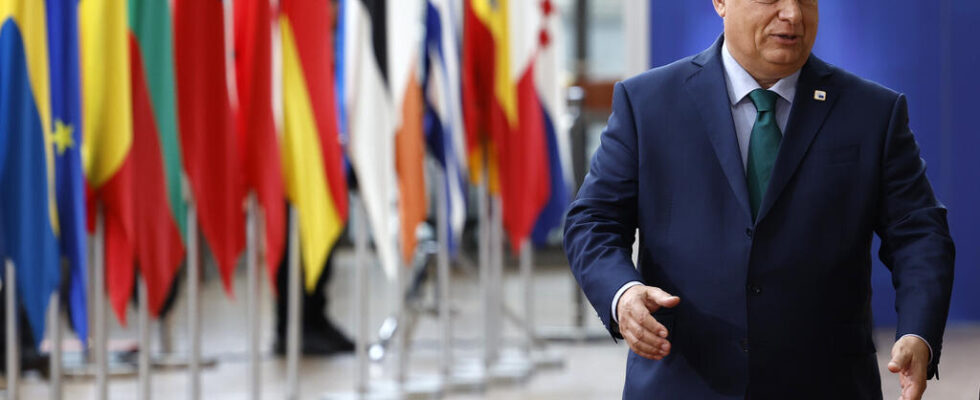On 1 July, Belgium will cease to hold the rotating presidency of the Council of the European Union, handing over to Hungary, which will be its president for a six-month period. This presidency is worrying European circles given the difficult relations between Brussels and the authorities in Budapest. But Hungarian Prime Minister Viktor Orban’s room for manoeuvre will be limited, even though the Hungarian leader has set himself the goal of ” to change the EU from within “.
4 mins
The slogan chosen by the Hungaryfor the presidency of the European Union that she will assume from this 1st of July and for six months, was not entirely random: ” Make Europe Great Again “, either ” make Europe great again », an obvious nod to the slogan of the ultraconservative Donald Trump. The former American president never hid his ideological and political proximity to Hungary. Viktor Orban.
Close to Donald Trump, but also to Russian President Vladimir Putin, Viktor Orban could take advantage of this rotating presidency to hinder aid to Ukraine and to leave his mark on a European Union that he has condemned for years.
Orban wants to leave his mark on Europe
The Hungarian presidency will nevertheless be limited in time, as it will be shortened by the summer break. It also comes at a time of transition with the establishment of the new Parliament and the new Commission in Brussels. Legislative activity will therefore necessarily be reduced.
Ultimately, the role that will be devolved to Hungary will essentially be that of mediator, of coordinator, something that the Hungarian ambassador to the EU has continued to emphasize for months.European Union Balint Odor, who assures that he wants to play the moderation card, where the Prime Minister Orban is accused of playing the role of confrontation.
Hungary: Hungarian Ambassador to the European Union Balint Odor speaks of a constructive presidency of Viktor Orban
European circles are concerned, particularly about aid to Ukraine
This presidency of Viktor Orban worries European circles who take note of the relations rather complicated between Brussels and the Hungarian authorities. Concern in particular concerning aid to Ukraine, which Viktor Orban wanted to slow down Many times.
Katalin Cseh is a member of the Hungarian opposition party Momentum and a member of the European Parliament in the Renew group. She also says she is concerned about the impact that the Hungarian presidency could have:
Viktor Orbán presented Ursula von der Leyen as an enemy of Hungary, and he accused the “Brussels bubble” of absolutely scandalous things that are lies.
Hungary: Momentum MEP Katalin Cseh expresses her fears of a Hungarian presidency on July 1
Imbroglio around a new European parliamentary group
On the eve of taking over the presidency of the European Union for six months, Hungarian Prime Minister Viktor Orban announced this Sunday, June 30, his intention to form a new European parliamentary groupwith the Austrian far-right party and the centrist movement of former Czech Prime Minister Andrej Babiš.
During the previous mandate, the European far-right was divided into two very distinct groups: ID, Identity and Democracy, where the National Rally sits, and the ECR group, Conservatives and Reformists, of Georgia Meloni’s Fratelli d’Italia. Recently, and despite deep differences between their two groups, particularly on the Ukrainian question, the two political leaders had become closer with discussions facilitated by the exclusion of the controversial German AfD party from the ID group. Exclusion occurred after new controversial statements from the German group. However, we were still far from a merger between the two groups.
The idea of a far-right supergroup is now shattered
In this context, the announcement by Victor Orban’s Fidesz of wanting to form a new and third far-right group shatters any idea of a far-right European parliamentary “supergroup”. On the contrary, this announcement even further fragments this political movement. Indeed, the Austrian FPO party associating itself with this initiative called “Patriots for Europe”, this means that its six MEPs, who until now sat with ID, will leave it to join this third group of far right.
The situation is definitely fluid, since in parallel, the AfD, after its exclusion from the ID group, was still trying until recently to form a parliamentary group, by allying itself with small non-registered parties. If the initiative were to go through, it would create a fourth far-right group in the European Parliament.
Viktor Orban preferred to create his own group rather than join ECR, the European Conservatives and Reformists group or ID, the Identity and Democracy group of which the French National Rally is a part. A logical choice nonetheless according to Arsenio Cuenca, a doctoral student at the École Pratique des Hautes Études and a researcher specializing in the extreme right.
Orban’s objective is to liberate a European family, which would be impossible by joining the group of reformist conservatives.
Hungary: Researcher Arsenio Cuenca explains why Viktor Orban created this new European parliamentary group.
Read alsoHungary facing Europe: Viktor Orban’s sovereignist challenge
